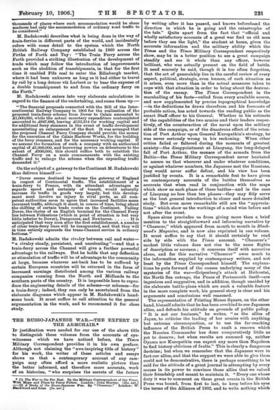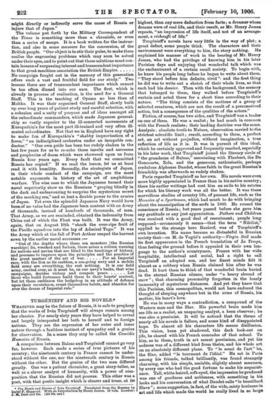11411 RUSSO-JAPANESE WAR.—THE EXPERT IN THE ARMCHAIR.*
IF justification were needed for our use of the above title to distinguish these volumes from the accounts of eye- witnesses which we have noticed before, the Times Military Correspondent provides it in his own preface. Although not claiming the "awe-inspiring title of history" for his work, the writer of these articles and essays shows us that a contemporary account of any cam- paign may often afford a more realistic picture than the better informed, and therefore more accurate, work of an historian, "who surprises the secrets of the future
* (1) The War in the Far Bast By the Military Correspondent of the Times. With Maps and Plans by Percy Fisher. London John Murray. [21s. net.] —(2) A Study of the Russo•Japanese War. By " Chagsear." London : W. Blackwood and Sons. [Cs. net.] by writing after it has passed, and knows beforehand the direction in which he is going and the catastrophe of the tale." Quite apart from the fact that "official and wholly satisfactory accounts of a great war find us old men before they see the light," the student at home, given the accurate information and the military ability which the Times and the Times Military Correspondent respectively show, may be in a better position to see a great campaign steadily and see it whole than any officer, however brilliant, who was actually present on the field of battle. It need scarcely be said, though it is too often forgotten, that the art of generalship lies in the careful review of every aspect, political, strategic, even human, of each situation as it arises, even more than in the actual measures taken to cope with that situation in order to bring about the destruc- tion of the enemy. The Times Correspondent in the marshalling of his facts—culled from every available source, and now supplemented by precise topographical knowledge —in the deductions he draws therefrom and his forecasts of probable action, has acted towards the reading public as the smart Staff officer to his General. Whether in his estimate of the capabilities of the two armies and their leaders respec- tively, of the counteraction of the naval upon the military side of the campaign, or of the disastrous effect of the reten- tion of Port Arthur upon General Kuropatkin's strategy, he was never seriously wrong in his reckoning. When other critics failed or faltered during the moments of greatest anxiety—the disappointment at Liaoyang, the long-delayed fall of Port Arthur, the menace of the armada from the Baltic—the Times Military Correspondent never hesitated to assure us that wherever and under whatever conditions, or against whatever numbers, the Japanese met the Russians, they would never suffer defeat, and his view has been justified by events. It is a remarkable feat to have given us contemporary accounts of the battles themselves so accurate that when read in conjunction with the maps which show us each phase of these battles—and in the case of Liaoyang no less than ten phases—they may fitly serve as the best general introduction to closer and more detailed study. But even more remarkable still are the "apprecia- tions " which show us the workings of a mind wise before and not after the event.
Space alone precludes us from giving more than a brief mention to the straightforward and informing narrative by " Chasseur," which appeared from month to month in Black- wood's Magazine, and is now also reprinted in one volume. It must suffice to say that it should certainly be read side by side with the Times account. " Chasseur's " modest little volume does not rise to the same flights of description or sarcasm ; it concerns itself with narrative alone, and for this narrative " Chasseur " owes much to the information supplied by contemporary writers, and not least by the Times Correspondent himself. The explana- tions he puts forward of the causes underlying many of the mysteries of the war—Gripenberg's attack at Heikoutai, the North Sea outrage, the Peace of Portsmouth itself—are ingenious and suggestive, and in addition, though unaided by the elaborate battle-plans which are such a valuable feature in the more complete work, his general story is clear and his arguments and conclusions well reasoned.
The representative of Printing House Square, on the other hand, himself admits that he has been overkind to our Japanese allies, and defends his attitude on grounds of public policy. " It is not our business," he writes, " as the allies of Japan, to criticise the leading of her armies with anything but extreme circumspection, or to use the far-reaching influence of the British Press to exalt a renown which the Russian Commander has done comparatively little as yet to deserve ; but when results are summed up, neither Oyama nor Kuropatkin can expect any more than Napoleon to find history oblivious of faults." This is clearly a dangerous doctrine; but when we remember that the Japanese were in fact our allies, and that the support we were able to give them could not be demonstrative, there is perhaps something to be said for the attitude of a great journal in attempting by every means in its power to convince those allies that we valued their friendship and meant to maintain it. "Every one whose duty it was to comment on these great events in the British Press was bound, from first to last, to keep before his eyes the terms of the Alliance of 1902, and to write nothing which might directly or indirectly serve the cause of Russia or injure that of Japan."
The volume put forth by the Military Correspondent of the Times is something more than a chronicle, or even than a series of essays. It is a book written for the instruc- tion, and also in some measure for the conversion, of the British people. " Our object is to stir their pulse, to make them realise the engrossing problems which may soon be solved under their eyes, and to point out that those solutions must con- tain lessons of surpassing interest and transcendent importance to that great maritime association the British Empire No campaign fought out in the memory of this generation offers such a vast and fruitful field for our study." Two lessons there are of transcendent importance which cannot be too often dinned into our ears. The first, which is already in process of realisation, is the need for a General Staff. This is the teaching of Oyama no less than of Moltke. It was their organised General Staff, slowly built up over long years of patient study and careful selection, with a cohesion and a unity of purpose and of ideas amongst all the subordinate commanders, which made Japanese general- ship so vastly superior to the ill-concerted movements of Kuropatkin's for the most part ill-trained and very often ill- mated subordinates. Not that we in England have any right to make fun of Kuropatkin's "shabby improvisation of a force," " an indisciplined orchestra under an incapable con- ductor." " Our own pride has been too rudely shaken in the last few years for us to re-echo those insults and sarcasms and prophecies of doom which were showered upon us from Russia four years ago. Every fault that we committed Russia has copied." If we read the lesson, let us at least read it with humility. Secondly, the strategists of Japan, in their whole conduct of the campaign, are the most notable exponents in history of the art of amphibious warfare. The wise uses to which the Japanese turned their naval superiority show us the Russians " groping blindly in the dark and endeavouring to surprise the mysterious secret of the mocking sea," and so lent a double power to the armies of Japan. Yet even the splendid Japanese Navy would have been of no value had the Japanese been content with an Army of thousands, instead of hundreds of thousands, of men. That Army, as we are reminded, obtained the indemnity from China out of which the Fleet was built. It was the Army, again, that on August 10th "shook the over-ripe fruit of the Pacific squadron into the lap of Admiral Togo." It was the Army which at the fall of Port Arthur reaped the harvest sown by the earlier naval successes :—
" Out of the depths where these sea monsters [the Russian warships] lie, wrecked and forlorn, there arises a solemn warning for nations and navies that are blind to the teachings of history, and presume to improve upon the principles and the practice of
the great masters of the art of war For an Imperial race, with the lion as its emblem, a sea-going navy and a mobile field army are everything, the rest nothing. It is our field army, carried over, as it must be, on our navy's backs, that wins campaigns, decides victory and compels peace. Let those who build fortresses build them to their hearts' content, but let them emblazon the hedgehog in an attitude of defence upon their escutcheon, count themselves helots, and abandon for ever the dream of Imperial rule."











































 Previous page
Previous page